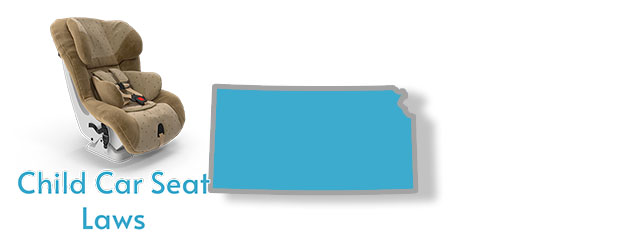A Summary of Child Car Seat Laws in Kansas
- The Kansas Highway Patrol recommends children under 1 year should ride on rear-facing seats.
- According to the Kansas Highway Patrol, children aged 1 to 3 years can graduate to a forward-facing seat once they outgrow the rear-facing seat requirements.
- Children of ages 4 to 7 years should ride on a booster seat secured in the back seat as long as they weigh less than 80 pounds and are shorter than 4’9’’.
- Children under 14 years but 8 years or older are not prohibited from sitting in the front seat.
Rear-facing Car Seat Laws in Kansas
The Kansas Highway Patrol recommends children less than 1 year should ride on rear-facing seats. However, the AAP (American Academy of Pediatrics) recommends children should ride rear-facing until at least the age of 2 years or when the car seat manufacturer’s height and weight limit have been exceeded. While there are a variety of seats to choose from, infant-only seats should always face the rear of the car. On the other hand, convertible seats usually have higher weight limits (up to 40 pounds) and allow you to turn the seat forward when your child outgrows the rear-facing position. Parents should use the rear-facing seat for as long as possible since it protects the child’s fragile body parts by absorbing crash forces. The seats should always be secured in the back seat away from an active airbag.
Forward Facing Car Seat Laws in Kansas
According to the Kansas Highway Patrol, children aged 1 to 3 years can graduate to a forward-facing seat once they outgrow the rear-facing seat requirements. However, some children may reach age 4 before outgrowing the rear-facing requirements due to some seats accommodating kids of up to 40 pounds. The forward-facing seat should have a harness and tether. This helps by limiting the movement of the child during a crash. Seats of this type can hold children of up to 65 pounds, so this means your child may probably outgrow the seat’s requirements when closer to age 7. This also depends on the child’s growth rate. The seat should be secured in the rear of the car with the shoulder straps positioned just above your child’s shoulders.
Booster Seat Regulations in Kansas
The Kansas Child Passenger Safety Act requires children of ages 4 to 7 years to ride on a booster seat secured in the back seat as long as they weigh less than 80 pounds and are shorter than 4’9”. The booster seat must be used with shoulder belts and lap belts. You are not allowed to use lap belts only to secure booster seats. The shoulder belt should properly fit over the child’s chest area and the lap belt should snugly cross the upper thighs. However, if your child is older than 7 years and has not exceeded the height and weight criteria of the booster seat, it is recommended to keep them on a booster seat until they do so. Additionally, most experts encourage parents to focus on height when it comes to booster seats. This is because regular seat belts may not fit children with a height of less than 4’9”.
Requirements for children to use the front seat in Kansas
Children under 14 years but 8 years or older are required by law to ride in a car while wearing a seat belt. This means it is not illegal for your child to sit in the front seat as long as he or she is wearing a seat belt and is within this age range. However, most experts recommend keeping your child in the back seat until age 13. This is safer because the airbag present in most front seats can be lethal to a child in case of an accident. Also, the Kansas Highway Patrol insists on transitioning your child from a booster seat only when he or she is mature enough to fit in a seat belt. Typically, this happens at a height of 4’9’’. A proper fit means the shoulder belt lies low across the chest and the lap belt snugly crosses the upper thighs.
Law on Children under age 14 in Kansas
Children under 14 years are not allowed to ride in portions of the vehicle not intended for passengers. This also includes sitting in the back of pickup trucks during travel. In case of a violation, a fine of up to $60 plus court costs may be imposed.
Law on Leaving a child in a car in Kansas
The law does not state any clear rules for leaving a child unsupervised inside a private vehicle. However, we do not recommend that you leave a child alone in the vehicle for any length of time.
Car Seat Laws Exemptions in Kansas
No law requires taxis to comply with Kansas car seat laws.
Law on Smoking in a car with Child Passengers in Kansas
There is no law in Kansas that covers smoking in a car in the presence of children. The Kansas Indoor Clean Air Act only makes it illegal to smoke in taxis. However, doing so in some parts of Kansas may land you in jail. So make sure to check with your local health department.
